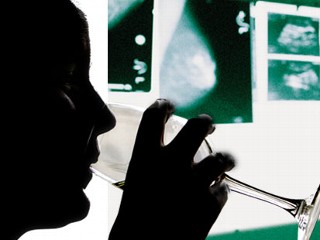What Doctors Don’t Tell You
It is, in fact, no secret at all that
alcohol causes cancer. Rather than conferring any demonstrable metabolic benefit, alcohol is more likely to damage your health in a variety of ways. The body converts alcohol (ethanol) into acetaldehyde as part of the metabolic process, and acetaldehyde is carcinogenic in sufficient quantities. Drinkers are particularly susceptible to cancers of the head and neck, as well as the liver, breast, and bowel.
However, you wouldn’t know this if you only talked to doctors. In a
commentary written for the journal
Addiction, Terry Slevin and Tanya Chikritzhs of Curtin University in Perth, Australia, suggest that health professionals may be consciously or unconsciously in denial.
A 2015 survey taken in the UK demonstrated that only about 13% of the population was aware of a link between alcohol and cancer. Moreover, surveys of physicians show that “significant proportions are not aware of or resist the notion that alcohol causes cancer and do not advise their patients of the relationship. This is compounded by the fact that many physicians are reluctant to ask about patient alcohol use, particularly when drinking does not appear to have a direct impact upon their health.” (98% of medical students in a survey from Saudi Arabia, where drinking is rare, said that alcohol causes cancer.)
The authors raise the following question: Could individual alcohol use among doctors be part of the problem? Some studies have shown that physicians drink more than average, other studies conclude that they drink about the same as everybody else. As for attitudes about drinking, the authors reference a U.S. study showing that 24% of doctors admitted to having imbibed alcohol while on call. 64% reported witnessing colleagues who appeared to be under the influence of alcohol while on call.
Given that most doctors probably drink socially at about the levels one would expect of the general population, the authors point up the possibility that a form of cognitive dissonance might be behind an apparent, perhaps unconscious reluctance to discuss the alcohol/cancer link. If true, “an important source of health information for members of the public may not be communicating the alcohol-causes-cancer message consistently or effectively.”
The alcohol industry itself has always viewed the alcohol/cancer question primarily as a threat to sales. These powerful companies exhibit “a vested interest in maintaining the status quo of relative ignorance, uncertainty and denial among the general population and their trusted health advisors. In the face of this, it is time that health professionals set aside any leanings that might stem from their own drinking—good or bad—and convey unreservedly to their patients and the communities they serve that alcohol causes cancer.”
Graphics: http://www.alcoholandcancer.eu/risks/







